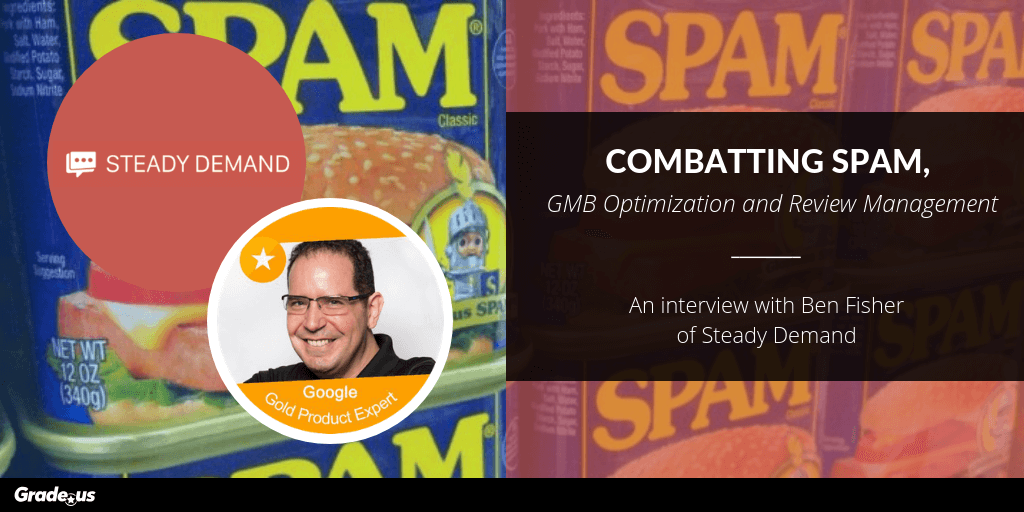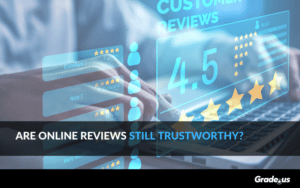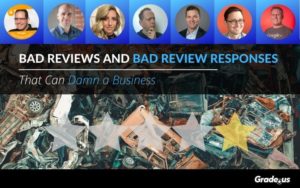There was barely an internet when Ben Fisher got his start in internet marketing. It was 1994, and most of us were still shrieking along on old dial-up modems. In a time where many businesses were reluctant to so much as put their URL on their business cards.
In the 2000s, he worked with enterprise-level SEO, mainly with hosting companies. In 2013 he shifted over to local SEO. This led him to becoming a GMB Gold Product Expert (formerly known as a Google top contributor).
I had the privilege of sitting down with Ben the other day.
He had a lot to share, including some exciting new developments from GMB and a little-considered way to achieve a quick win for clients. Here's the lightly edited transcript of our chat.
On Becoming a GMB Gold Product Expert
Carmen: So, how did you become a GMB Gold Product Expert?
Ben: It happened after I had some frustration with Google Support while trying to help a client of mine.
There was a gun shop out of Sacramento, CA. Google had removed them from Maps. I called support and got someone out of India. They told me gun shops were not allowed on Google Maps anymore, so they were removing them.
I asked why, and the agent said, "Guns kill people!"
I said, "really? Can I speak to your manager?"
The supervisor gets on the phone with me and says, "Yes, gun stores are not allowed on Google Maps."
"So you're going to remove all gun shops from Google maps?"
Emphatically he says, "Yes."
"Statistically, alcohol kills more people than guns. Are you going to remove all liquor stores?"
He says, "Yes."
I said convenience stores sell alcohol and cigarettes which collectively kill even more people.
So I went to the advertiser community with, "Here's my case number, please tell me that isn't true."
Joy Hawkins got involved, and at least got clarity on the guidelines about regulated industries. In that pursuit I decided I really wanted to get involved in the community and I wanted to help other users. Mainly because the information was not always accurate coming out of Google Support, and if I was feeling that frustration, I was sure thousands of other people were also feeling that frustration.
So I started on my quest to start helping users, and started learning more and more about GMB. You can learn a lot just by helping people. Six months later I was invited to join the GMB Product Experts program.
On How GMB Product Experts Help Improve Google Support and Their Accuracy
Carmen: If information is not always accurate out of Google Support, how do you make sure you're accurate as an expert?
Ben: First, the support mechanism where you call to support; most of the time that goes to India. While they receive training, they're not always as accurate as someone from Denver, or Mountain View.
Experience also plays a large role. It's also the fact that, when we (GMB Product Experts) answer user questions, they go ahead and put what we recommend into practice. Most of the time they'll come back and either say, "Yes, that worked," or "nope, that didn't work."
So, we get a lot of almost real-time feedback from users.
But probably the most important thing, is we get to interface as product experts directly with the engineering team, product managers, and our wonderful community managers.
There's also talking to our peers within our product expert group, which includes people like Joy Hawkins, Mike Blumenthal, Jason Brown, Tom Waddington, James Clemens, Colan Nielsen. The list goes on and on.
There's fifteen of us right now at least. We collaborate in real time as well.
So if we see something that's brand new, we talk about it. If we have questions ourselves, we can bounce it off of each other. With the ultimate goal of being and finding 'how can we best solve the problem for a user?'
Because nobody knows everything.
I do encourage marketers, agency owners, or people who are just really passionate about GMB to try and get involved in the community. We're always on the lookout for other people that can join the product expert group. It is invite only. So we do look for that expertise.
And there's a lot of people that report spam, and are pretty good at it actually, so we really encourage people to come in and be active in the forums and help other people out, because that's where we look for other product experts.
On Combatting GMB Spam #StopCrapOnTheMap
Carmen: GMB is plagued with a lot of spam. How do you go about combating it?
Ben: As product experts, we see a tremendous amount of spam on a daily basis. We have a hashtag that Joy Hawkins came up with a long time ago called #stopcraponthemap.
Google even monitors that one now.
Google Facebook support and Twitter support are fabulous places to report spam.
They won't give you feedback on whether it's been removed or not, because you don't own the accounts. But if you come to the forum and one of the product experts looks at it, we'll get back and let you know what Google's decision has been and whether it's been removed or not.
It's one of the things that a lot of us Product Experts really enjoy doing, which is getting rid of spam. We uncover networks of spam on a daily basis.
There is one case in particular that was found by Jason Brown, who also runs a site called reviewfraud.org, where Jason and Helmut (another Product Expert), discovered a bunch of accounts, about 25 in total, leaving a massive amount of 1 star reviews. And they'd left millions of reviews on businesses.
It's like we just found one where there was an SEO company that had over 300 listings for themselves.
Note: Jason Brown also discussed this incident during his interview. If you missed it, you can read it here.
Carmen: What did they do, just make up a thing in every city?
Ben: Yeah, multiple cities. They could have like nine in San Diego.
Literally making fake addresses, using virtual offices, many other ways I don't want to share because we don't want people doing it, but yeah, they do that, and usually when someone is doing virtual location spam, they're also doing review spam as well.
In this case with this company it was pretty easy to track down because they were doing it for all their clients as well.
This all came, and was discovered by one person reporting it on the forums. So my point there , one person can truly make a difference.
Carmen: So this one person wasn't a Product Expert, just a business owner, marketer, or consultant?
Ben: Exactly. Could be any one of those, by the way. When somebody reports spam, we'll dig into it deeper, and Google will dig into it even deeper than us, usually.
Classic example: somebody would come in and report, another SEO company, oh well they've got this name-stuffed listing. I looked at the name-stuffed listing, I looked at the reviewers, and I saw the reviewers had also reviewed another company that had a strikingly similar name in another city. Both reviewers had left a glowing, 5-star review on another listing. It just so happened one of them was the owner. I'm assuming the other was probably an employee. Both profiles were removed.
These are bad experiences for users at the end of the day, who are actually doing a search, and so the more they can be cleaned up the better, is how they look at it.
Carmen: I don't think I've heard the term name-stuffed listing before, what does that mean?
Ben: Let's say you wanted to call yourself Carmen's Local SEO Reputation Management Company Near Me.
Give me a second, I'll bring up an example of someone I publicly shamed. Oh yeah, here's a fun one, and he's still doing it. I'm investigating a massive spam network right now all across the country. I happened to find these guys.
I'm not going to drop the company name right now because I'm letting Google handle it, but it's "[Company Name], Car Accident Attorney, Personal Injury Lawyer, Auto Accident Law Near Me."
They have the same thing just including Newark, or Jersey City. I'm just doing a query on "auto accident attorney", and this guy has over six listings named exactly how people just said it was.
Carmen: I can't believe someone would hire someone named like that.
Does that actually work for them?
Ben: It does drive phone calls, yes. Why an average user would want to, I have no idea.
On GMB Features in the Pipeline
Carmen: As a Gold Product Expert is there anything coming down the pike you're really excited about?
Ben: So Google My Business has become a lot more of the transactional layer of the internet, in which I believe 70% is the number of transactions are happening from the Google My Business profile vs. someone actually going to the website of a business profile. So they're doing it right there, whether they're picking up the phone and calling, or it's on mobile and they're just clicking on directions or call.
GMB's made tons of updates to the GMB profile capabilities for small businesses over the past year. And those are just going to be increasing at an even higher pace this year.
Carmen: What kind of capabilities? Are they trying to turn it into a mini-website?
Ben: You can kind of think about it like that. They've renamed it from a Google My Business listing to a Google My Business Profile. Which I think is very smart, because it more accurately represents what it is. It is really your profile of your business on Google.
Now that it has the capability to do posts which are fantastic for sharing information and controlling a valuable part of the real estate for your GMB profile, you can do questions and answers which is basically like having a FAQ, to even having where you can enter in the description of your business, which is different than the editorial snippet.
So it's not really a website, per se, because Google also gives you that capability if you want to build a website, you can do it within GMB as well. It's really a way to present information.
The future features I'm excited about come down to the messaging feature, which allows a user to just click "message" and it will either send a text message or they'll be a GMB Mobile App notification, so that the business can, and the user, can have a direct communication with each other.
The other thing I'm excited about is the follow feature, which is very new. The follow feature right now can only be found when you click on a profile on mobile.
Once you click on "follow," if you follow a business profile, then in the Google Maps For You section, which shows you a bunch of recommended places you can visit based on your preferences, will now show GMB posts from business that you followed.
And I can see this feature expanding potentially to desktop and other areas that Google has. Other surfaces basically that Google has. There's no official word on that, that's speculation on my part.
Carmen: On the messenger are they going to be able to use chatbots like they do on Facebook?
Ben: Currently the answer to that is "I don't know." Google is a machine learning, AI-first company. Is it possible they'd put chatbots in there, maybe? But in the current format, no.
And then there's the whole aspect of Book With Google. I think it's going to be rolled out to a lot more industries.
Carmen: It's just hospitality right now right?
Ben: Yeah, hospitality and a limited set of people involved at the moment. But it's not too far of the imagination for the app to become almost a CRM one day. But again, hypothesis.
On Combatting Spam For GMB
Carmen: Is combating spam something every agency should focus on? And if so, how?
Ben: So I think the answer of is combating spam every agency should focus on is a resounding yes. It is one of the easiest SEO wins that an agency can deliver for their clients.
Now, combating name spam, or stuffing that we were talking about, that's not so easy to enforce. And I know a lot of agencies that will maintain a list of competitors for their clients, and they'll change the name, and the company will change the name back, and it will go back and forth and back and forth. It never ends.
I personally think that's a waste of time. However it is not a waste of time to report them to Google via social media or the advertiser community for name spam. Cause most of the time, when companies are doing name spam, they're also doing location spam. So, when you're doing the report, you might not even know it, but that company might have ten virtual locations.
Google will know these things. So reporting them for name spam gives Google a record of it and might uncover other things. Which could lead to your competitor's listing getting removed from Maps.
There's this really good article that I did on Bright Local about removing review spam and getting reviews looked at, and Joy Hawkins has some excellent guides on the reporting of spam, and there's a guide I have on my site on how to contact GMB in the first place.
I want to talk about how to go about combating it. So again, Joy Hawkins has some really great guides about how to go about combating spam, but one thing people should really focus on is the details. And also doing research. Before submitting something as spam.
So, we find it very helpful when somebody takes the time to give us the full name, address, and telephone number of a profile. If it's a service area business obviously you can only give us the state and zip, which is fine. But then go a step further. Take a look at the Secretary of State and see if that business actually has an entity that's paying taxes in that state. Secondary step is you could look at DBAs as well, but usually that's not necessary.
Take a look at the BBB. Do they have a verified profile? If it's a lawyer, does the address or even the state match with the bar?
There's other things that can be done too, just simply looking at street view for the profile. Can you see the business's signage? Another thing is and a lot of people don't do this: is just simply put the address if there's a full address, put the address into Google search minus the suite number, if there is one, and see if a virtual office listing appears. If so, then the chance that it is a spammy location is pretty high.
It might also be a UPS Store.
Although, you gotta admit it really is kind of funny when you find a listing for a lawyer inside of a KFC.
Carmen: Did that happen?
Ben: Yes! Keiser Firm Car Accident Lawyers. I found them last night, are inside of a KFC in Texas. Either he's doing a whole Saul Goodman thing, where he's working out of the back of the KFC, or it's a spammy location. I don't know. You decide.
But simply taking a look at street view showed this by the way.
Carmen: You almost want to report him to the Texas Bar while you're at it.
Ben: There are people who do that. He doesn't have a website on there, but he does have a phone number on there, so with enough investigation you can find out who it is. But yes, this individual, whomever he is, gets disbarred, unless you're a lead generation company which is also common.
Carmen: I gotta imagine it still counts as spam if it's a lead generation company.
Ben: Yes, they're not allowed on GMB. Absolutely.
On Combatting Spam of Reviews on GMB
Carmen: Let's talk some about review spam. How do you spot it, how do you investigate it, and what's your next steps?
Ben: Let me think about this, because I don't want to educate the spammers.
There's a lot of review spam that goes on. There are review swapping networks, people who go out and buy reviews en masse, it's prevalent. And some of the people who do fake reviews do it with malicious intent, kind of what we were talking about earlier, to bring down somebody's review score, or just make the company look bad.
Sometimes it's just a local guide who's trying to build up their points because they think having a high level status as a local guide is going to help them. It doesn't, actually. It's the quality of edits and reviews that matter to Google, not the quantity.
And in looking at review spam for say, a client, I'll give you an excellent case that I worked on.
I had a immigration lawyer who ended up getting about ten fake reviews. Upon initial inspection of those reviews, it didn't look like there was that much we were going to be able to do about it. They all came from an individual account that only had one review, that was on her, some of them were written in Spanish, others were just kind of a couple of words. Upon investigation, we were able to discern a pattern between the reviews.
Some common misspellings. Which we were able to match those misspellings to a client, to ex-client communications. And we were also able to identify that the reviews all came in within about an hourish, the same day, after she received a positive review. We were able to submit the evidence to Google, and all the reviews were removed.
Now obviously there were some other things probably in play there like IP addresses and such, but the point is that how you go about responding to negative reviews or attacks is by doing the research.
We see a lot in the forums where people will come to us and say, "I'm going out of business, I got a one star review, I don't know who this is." That doesn't help. Doing the research and taking a look to see if there's anything that stands out, that helps.
If you look at a reviewer's profile and they've left reviews for ten lawyers, thirty roofers, all over the country in the last five days? That's either somebody who's got a lot of problems with their roof and a lot of legal issues to deal with in a short period of time, or they're probably getting paid to leave reviews.
On Business Owners Using Reviews to Improve Their Business
Carmen: How can business owners better use online reviews as a way to improve their own business? Why do you think they do that or don't do that?
Ben: So, a lot of people have used the technique called "review gating," which is against Google's guidelines. And I already know Grade.us doesn't do that!
[Note: Grade.us offers review segmentation for non-Google review sites like Facebook, BBB and other review sites where it doesn't break the terms of service]
But they use it to filter out negative reviews, keeping them from getting to the Google profile.
However, it's usually marketed under the guise that a business can review the negative feedback to improve their business.
The fact of it is that most businesses I don't think pay that much attention. They just want the positive review, and they're not going to change their business model or behaviors. However, I think that negative reviews are a fantastic source of intelligence that can truly show you the weaknesses within your business, so that you can improve on how you do things, basically. And I really wish more business owners would take that to heart.
I know a lot of our clients read every bit of the negative reviews that go up, they allow those to go up on their profiles, they publicly address the issues, they say here's what happened, I apologize, let's get on the phone, we'll figure it out. They do, and then the reviewer usually goes back and rewrites the review.
So I think it can be a great learning experience.
On the Best Practices and Challenges of Responding To Reviews
Carmen: What's your philosophy on responding to reviews, and what are most businesses doing wrong?
Ben: I have a really in-depth article I did on Bright Local on this.
So basically, I think that every review should be responded to. Positive and negative. I don't care if it's handled in-house or outsourced. For instance, we respond to reviews for our clients. If it's done in-house, the first big piece of advice I give everybody? Take a chill pill! Relax! It's not the end of the world! You're not going to go out of business! You're not going to lose millions of dollars! (For a negative review).
Or if it's a one-star with no content recommendation review, say. People ignore those.
But relax, first. Be calm. And answer in an objective manner. If it is your mistake, something that you truly did, own it! And then offer to resolve it.
If it is not your mistake, be sympathetic, compassionate, empathetic, and offer a path to resolution.
Usually something as simple as, "I'm sorry you had XYZ kind of experience with us, please email me with your phone number and I'll go ahead and call you, and we'll resolve it."
Carmen: Because a lot of people just want to be heard.
Ben: Exactly. They just want to be heard. Most people when they leave a negative review, it's a way of venting.
And sometimes it is because, truly, they were ignored. That does happen. Or sometimes they don't vent their frustration at the time of purchase or service. And then later on they just go on line, grrr, gonna get back at that guy.
The best thing you can do, and I have some awesome clients who do that, and they will call the customers and they will work through the problem.
Carmen: How does SteadyDemand help businesses with review responses?
Ben: We do a very well-written response. Everyone on our team has a PR background, or a journalist background, a Bachelor's or Master's, so they're great writers.
We base our responses on frameworks, not templates. We reply to the review and the client gets an email that sees what our response was.
Then the reviewer will actually email the client with their phone number, or the client will already have, and they'll respond it, so that's it.
Carmen: Can you explain frameworks vs. templates a little more?
Ben: So there's a huge difference. Most people work off of templates. The problem is that templates can get repetitive. If you look at somebody's reviews and every time they respond and the only thing they say is, "Thank you?"
That doesn't really show you care very much.
So, and that's what a lot of people do. They'll have the same canned response, and they'll just copy and paste.
A framework, however? Gives you a feeling for the voice of your customer. So, we request, at the minimum, three positive review frameworks from our clients. And at least one negative review framework. And off of that we are able to craft very unique responses to every single review.
I don't care if it's ten or a hundred. Every response is different.
Carmen: Are you sending them a form they're filling out, or are these example responses?
Ben: Yes, they're example responses. It's during our intake process. We're asking for the frameworks which are, in a sense, example responses.
Carmen: We could probably do a whole other article on the importance of a good intake process.
Ben: Bigtime! Agencies have big problems with that, too. And we're one of them! It's sometimes impossible to get a client to fill out an intake form.
On the Biggest Challenges for Agencies and Small Businesses with Reputation Management and Local SEO
Carmen: What's the biggest problems most businesses and agencies have with their online reputation or local SEO?
Ben: We discovered that most businesses or agencies usually will set up their Google My Business profile, and they're done.
They don't revisit it ever again. Or maybe they'll do it once a year.
So we fully optimize Google My Business, including the seeding of the questions and answers. We also monitor those, and respond to any new ones with the reviews we're constantly monitoring and responding to all reviews, whether they're on Google, Facebook, Yelp, it doesn't matter.
And we also handle a lot of their directories and citations. And I guess you can really just consider all of this the foundational aspects of local SEO.
The other thing is we give our clients and agency partners the ability for someone to be reminded to add a photo to GMB, via a text message. No logging into GMB to add a photo needed, just respond to a text message.
And again this is all foundational, but the importance of Google My Business was shown in the Moz Local Ranking Factors study compiled by Darren Shaw, and included 33 people from the local search industry. GMB signals made up 25% of the ranking factors for the local pack/finder ...if I remember correctly that was a +32% change over last year.
So yeah, a lot of business owners and agencies just don't think about going back to GMB, or they don't have the time. I guess the other thing I forgot to mention is we specialize in doing GMB posts.
Which takes creativity, it takes writing. You've gotta think about a subject and something to write about every seven days. As we all know coming up with content is a hard thing to do, especially for SMBs.
Carmen: How can an agency or consultant work with Steady Demand to offer review response services to their clients? What does Steady Demand offer that really sets them apart from any other review response service?
Ben: Review responses are a part of our offering. We will respond to positive and negative reviews. Not just on GMB, but we will also respond on third party sites as well.
We work together with agencies to help with responding to reviews, managing GMB, creating content like GMB Posts and Q&A, as well as website/blog content. We also help agencies and businesses with consulting and spam fighting.
We work primarily with agencies, and small businesses directly, we have an amazing white label program for agencies.
It comes down to time, content, and expertise. We help save people time, we develop great content with skilled, professional writers, and we have the expertise of the GMB platform itself. We offer social media services as well, again also in a white label capacity.
Carmen: Fantastic! I think we've come to the end here, but thanks so much for your insights!
Ben: It was my pleasure, talk to you soon. You can find me on Twitter @TheSocialDude or @SteadyDemand, on my website at https://www.steadydemand.com, and on LinkedIn.
About the Author
Raney C. Hudson
Raney C. Hudson is an independent content consultant with a 10+ year track record in the digital marketing industry.











